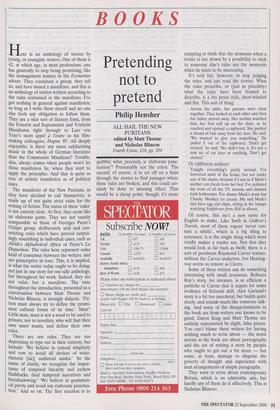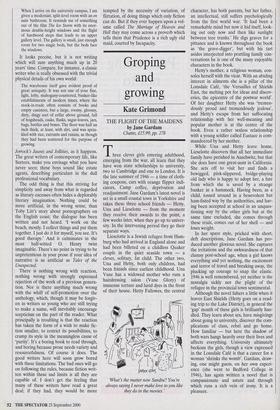BOOKS
Pretending not to pretend
Philip Hensher
ALL HAIL THE NEW PURITANS edited by Matt Thorne and Nicholas Blincoe Fourth Estate, £10, pp. 204 Here is an anthology of stories by young, or youngish, writers. One of them is 42, at which age, in most professions, one has generally to stop being promising, like the management trainee in the Economist advert. They constitute a group, they tell us, and have issued a manifesto, and this is an anthology of stories written according to the rules contained in the manifesto. I've got nothing in general against manifestos, so long as I write them myself and no one else feels any obligation to follow them. They are a nice sort of literary form, from the Futurist and Suprematist and Vorticist Manifestos right through to Lars von Trier's stern appel a l'ordre to his film- making colleagues, Dogme 95. All deeply enjoyable; is there any more exhilarating music in the whole of German literature than the Communist Manifesto? Trouble, alas, always comes when people won't let these manifestos lie, when they start to apply the principles. And that is quite as true of artistic manifestos as of political ones.
The manifesto of the New Puritans, as they have decided to call themselves, is made up of ten quite strict rules for the writing of fiction. The status of these 'rules' is not entirely clear. At first, they seem like an elaborate game. They are not exactly comparable to those of Georges Perec's Oulipo group, deliberately arid and con- stricting rules which have proved surpris- ingly nourishing in individual cases, such as Abish's Alphabetical Africa or Perec's La Disparition. The rules here represent some kind of consensus between the writers, and are prescriptive in tone. This, it is implied, is what the writer today ought to be doing; not just in one story for one silly anthology, but throughout his work. Indeed, they are not rules, but a manifesto. The tone throughout the introduction, presented as a conversation between Matt Thorne and Nicholas Blincoe, is strongly didactic. 'Fic- tion must always try to define the promi- nent cultural forms of its time.' Must? Little man, must is not a word to be used to princes; nor to novelists, who will find their own inner musts, and define their own rules.
There are ten rules. They are too depressing to type out in their entirety, but include: 'We believe in textual simplicity and vow to avoid all devices of voice: rhetoric [sic], authorial asides.' In the name of clarity, we recognise the impor- tance of temporal linearity and eschew flashbacks, dual temporal narratives and foreshadowing.' We believe in grammati- cal purity and avoid any elaborate punctua- tion.' And so on. The first reaction is to quibble; what, precisely, is 'elaborate punc- tuation'? Presumably not the colon. The second, of course, is to set off on a hunt through the stories to find passages where these rules are broken, and this could cer- tainly be done to amusing effect. That would be a cheap point, though; it's more tempting to think that the moments when a writer is too drawn by a possibility to stick to someone else's rules are the moments when he starts to be interesting.
It's only fair, however, to stop judging the rules, and just read the stories. What the rules prescribe, or (just as plausibly) what the rules have been framed to describe, is a dry prose style, short-winded and flat. This sort of thing: Across the table, her parents were close together. They looked at each other and then her father moved away. Her mother watched him, her feet still up on the chair, as he reached and opened a cupboard. She pushed a strand of hair away from her face. He said, `We wanted to give you something.' He pulled it out of the cupboard. `Dori't get excited,' he said. 'We didn't buy it. It's not a new set of car keys or anything. Don't get excited.'
Or (different author):
Tonight everything's pretty normal. I've hoovered most of the house, but not under any of the chairs, because it's not as if Mark's mother can check from her bed. I've polished the front of all the TV screens and cleaned both bathrooms. For dinner Mark's mum has Chunky Monkey ice cream. Me and Mark's dad have egg and chips, sitting in the lounge watching Neighbours from Hell in silence.
Of course, this isn't a new noise for English to make. Like Swift in Gulliver's Travels, most of these rogues 'never ven- ture a simile', which is a big thing to renounce; it is the single thing which most vividly makes a reader see. Not that they would look as far back as Swift; there is a sort of persistent Raymond Carver texture, without the Carver undertow, but Heming- way seems as remote as Cicero.
Some of these writers can do something interesting with small resources. Rebecca Ray's story, for instance, is so efficient a pastiche of Carver that it argues for some evidence of fictional skill. Alex Garland's story is a bit too anecdotal, but builds quite nicely, and sounds much like someone talk- ing. And some of the disappointments in the book are from writers one knows to be good; Daren King and Matt Thorne are unfairly represented by slight, false pieces. You can't blame these writers for having nothing much to write about — the worst stories in the book are about pornography and the act of writing a story by people who ought to get out a bit more — but some, at least, manage to disguise the poverty of thought and experience with neat arrangements of simple paragraphs.
They want to write about contemporary Britain, which is an admirable aim, but hardly any of them do it effectively. This is Nicholas Blincoe:
When I arrive on the university campus, I am given a modernist, split-level room with an en suite bathroom. It reminds me of something out of the film The lee Storm with its enor- mous double-height windows and the flight of hardwood steps that leads to an upper gallery level. The gallery is small, just enough room for two single beds, but the beds face the windows.
It looks precise, but it is not writing which will sum anything much up in 20 years' time. Compare, for instance, a classic writer who is really obsessed with the trivial physical details of his own world:
The warehouse itself gave evident proof of great antiquity. It was not one of your fine, light, lofty, mahogany-countered, banker-like establishments of modem times, where the stock-in-trade often consists of books and empty canisters, but a large, roomy, gloomy, dirty, dingy sort of cellar above ground, full of hogsheads, casks, flasks, sugar-loaves, jars, bags, bottles and boxes. The floor was half an inch thick, at least, with dirt, and was sprin- kled with rice, currants and raisins, as though they had been scattered for the purpose of growing.
Jorrock's Jaunts and Jollities, as it happens. The great writers of contemporary life, like Surtees, make you envisage what you have never seen; these boys sound like estate agents, describing particulars in the dull professional vocabulary.
The odd thing is that this striving for simplicity and away from what is regarded as literary excesses often hides a deplorably literary imagination. Nothing could be more artificial, in the wrong sense, than Toby Litt's story about pornographers on the English coast; the dialogue has been written and not heard. 'I work on the beach, mostly. I collect things and put them together. I just do it for myself, you see. It's good therapy.' And it culminates in the most half-witted 0. Henry twist imaginable. There's no point in trying to be unpretentious in your prose if your idea of narrative is as artificial as Tales of the Unexpected.
There is nothing wrong with reaction, nothing wrong with strongly expressed rejection of the work of a previous genera- tion. Nor is there anything much wrong with the whiff of self-promotion over the anthology, which, though it may be forgiv- en in writers so young who are still trying to make a name, will inevitably encourage scepticism on the part of the reader. What principally is troubling is that the reaction has taken the form of a wish to make fic- tion smaller, to restrict its possibilities, to cramp its style in the meaningless cause of `purity'. It's a boring book to read through, and boring because prose needs variety and resourcefulness. Of course it does. The good writers here will soon grow bored with these limitations. The bad ones will go on following the rules, because fiction writ- ten within these sad limits is all they are capable of. I don't get the feeling that many of these writers have read a great deal; if they had, they would be more tempted by the necessity of variation, of flirtation, of doing things which only fiction can do. But if they ever happen upon a vol- ume called The Marriage of Heaven and Hell they may come across a proverb which tells them that Prudence is a rich ugly old maid, courted by Incapacity.























































































 Previous page
Previous page